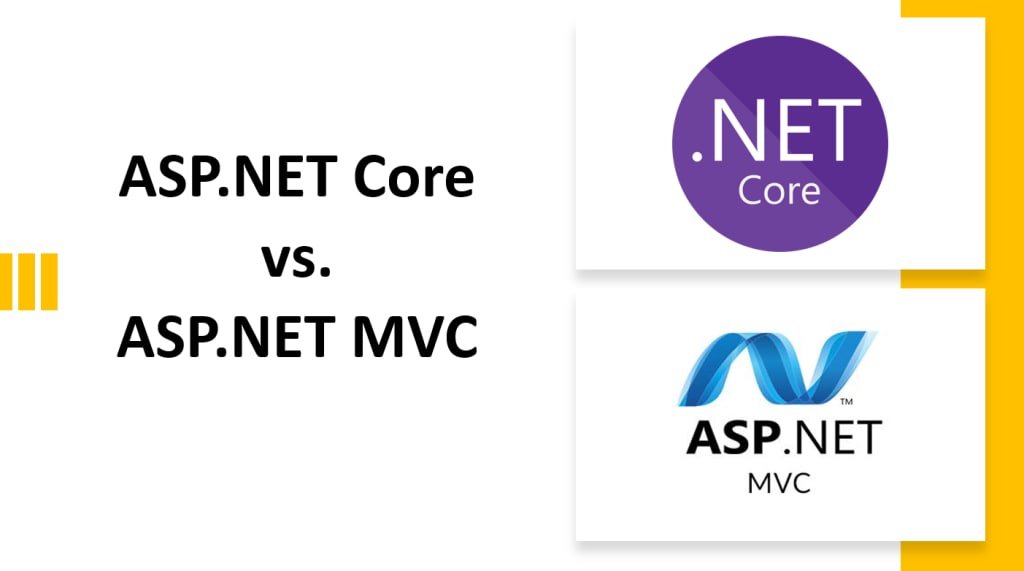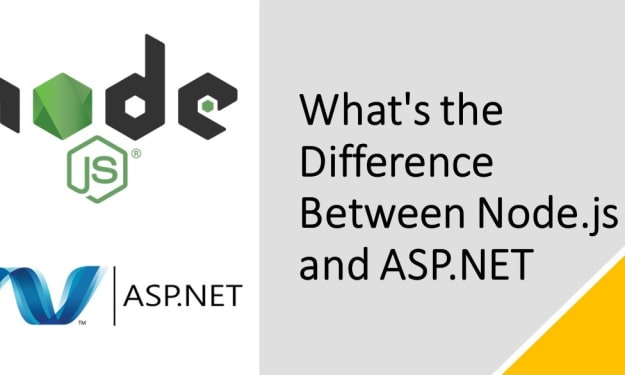ASP.NET Core vs. ASP.NET MVC Choosing the Right Framework
Comparing ASP.NET Core and ASP.NET MVC for Modern Web Development

ASP.NET Core and ASP.NET MVC are both popular web application frameworks used for building web apps and services on the .NET platform. ASP.NET Core is the newer, open-source and cross-platform framework that represents a complete rewrite of ASP.NET. ASP.NET MVC is the older framework that builds on top of the .NET Framework.
So which one should you choose for your next project? In this comprehensive guide, we' ll compare ASP.NET Core and ASP.NET MVC across various factors to help you decide which framework is better suited for your needs.
First let's briefly understand what each framework is:
ASP.NET MVC
- Released in 2009
- Builds on top of .NET Framework, which means it only runs on Windows
- Follows model-view-controller architectural pattern
- Open source but built by Microsoft
- Latest version is ASP.NET MVC 5
ASP.NET Core
- Released in 2016
- The cross-platform framework that runs on Windows, Mac, and Linux
- Complete rewrite of ASP.NET MVC without legacy code
- Built on .NET Core, which is a redesigned subset of the .NET Framework
- Follows model-view-controller pattern
- Open source and built by Microsoft and the community
- The latest version is ASP.NET Core 6
So, in a nutshell, ASP.NET Core is the newer cross-platform web framework that supersedes ASP.NET MVC in most scenarios.
Comparison Factors
Let's now dive deeper and compare ASP.NET Core and ASP.NET MVC across several factors:
- Performance
- Scalability
- Architectural Patterns
- Features
- Ecosystem
- Learning Curve
- Platform Support
- Popularity
- Licensing
- Ongoing Support
Performance
ASP.NET Core is faster than ASP.NET MVC because:
- ASP.NET Core does not have legacy code weighing it down
- Built on top of .NET Core, which is optimized for performance
- More efficient routing implementation
- Better support for asynchronous operations
- Runtime compilation for productivity as well as performance
Benchmark tests have shown ASP.NET Core to be consistently faster than ASP.NET MVC in request routing, view rendering, and response generation.
Scalability
Both ASP.NET Core and ASP.NET MVC can scale well with the exemplary architecture. However, ASP.NET Core has some advantages:
- Better support for microservices architecture
- Native integration with Docker containers
- Runs efficiently on Kubernetes for high scalability
- In-built components like environment-based configuration make it easier to scale
So, for large enterprise-grade applications that need to handle extremely high traffic, ASP.NET Core is generally easier to scale.
Architectural Patterns
ASP.NET Core is designed from the ground up to implement modern architectural patterns:
- Improved support for Model-View-Controller (MVC)
- Native integration for Web API development
- Built-in dependency injection
- Cloud-native and microservices-friendly
ASP.NET MVC predates some of these patterns, so it requires more custom plumbing code to implement them properly.
Features
ASP.NET Core has many new useful features that are either missing or hard to implement in ASP.NET MVC:
- Configuration framework for managing settings across environments
- Native dependency injection
- Integration with Entity Framework Core
- Built-in support for Web APIs
- Razor Pages for code-focused web development
- Better filtering pipeline for authorization policies
- Global error handling middleware
- Data Protection APIs
- Improved routing system
So, in general, ASP.NET Core has a richer feature set out-of-the-box.
Ecosystem
The ecosystem around ASP.NET Core is modern and aligned with current development practices:
- Open-source libraries on GitHub
- Package management using NuGet
- Cross-platform tooling based on .NET CLI
- Continuous integration/deployment using Azure DevOps
ASP.NET MVC relies on the older Visual Studio-based .NET ecosystem, which is Windows-centric.
Learning Curve
- For developers familiar with ASP.NET MVC, learning ASP.NET Core is relatively easy. The main concepts like MVC, Razor views, and Entity Framework stay the same. You need to learn only the updated APIs and new features.
- For fresh developers, both frameworks have a moderate learning curve. However, ASP.NET Core is probably easier to start using modern tools like .NET CLI.
Platform Support
- A key benefit of ASP.NET Core is its cross-platform support. You can develop and deploy ASP.NET Core apps on Windows, Mac, and Linux environments.
- ASP.NET MVC only supports Windows since it relies on the .NET Framework. This makes deployment more complex in non-Windows environments.
Popularity
According to StackOverflow surveys, ASP.NET Core is growing much faster than ASP.NET MVC in terms of popularity:
- In 2019, 37% of developers used ASP.NET Core vs. 45% for ASP.NET MVC
- In 2020, 50% used ASP.NET Core vs. 43% for ASP.NET MVC
- In 2021, 60% used ASP.NET Core vs. 37% for ASP.NET MVC
So, ASP.NET Core has overtaken ASP.NET MVC to become the de-facto web framework on the .NET platform.
Licensing
ASP.NET Core is open source under the MIT license, while ASP.NET MVC source code is shared under the Apache 2.0 license. Both are permissive licenses commonly used in ASP.NET development that allow modification and commercial use. So licensing is flexible for both frameworks when building ASP.NET applications.
Ongoing Support
Microsoft still supports ASP.NET MVC but is now in maintenance mode. The latest version, ASP.NET MVC 5, was released in 2013 and is based on .NET Framework 4.5.
ASP.NET Core is under active development by Microsoft. The latest version, ASP.NET Core 6, was released in November 2021 and has a predictable yearly release cadence planned.
So, ASP.NET Core has clearer ongoing support from Microsoft than the legacy ASP.NET MVC framework.
Here is a quick recap of the key differences between the two frameworks:
- ASP.NET Core is faster, more scalable, and has a richer feature set
- ASP.NET Core has better cross-platform support and a modern ecosystem
- ASP.NET Core is gaining more popularity and has active ongoing development
- ASP.NET MVC works only on Windows and has legacy conventions
So, in most cases, ASP.NET Core is recommended as the preferred web framework on .NET, especially for new development. ASP.NET MVC is still usable but only makes sense for legacy systems.
Final Words
ASP.NET Core is the future direction for web development on the .NET platform. With its cross-platform support, cloud-native capabilities, and faster pace of innovation, ASP.NET Core is a compelling framework for building modern web applications.
For new web projects, ASP.NET Core should be the default choice. It may make sense to continue using existing legacy systems based on ASP.NET MVC, but Core should be considered for any major rewrites or new modules.
Hence, unless you have specific legacy constraints, ASP.NET Core is highly recommended as the web framework for your next .NET project. Its advantages, like cross-platform support, performance, and an ecosystem aligned with modern development practices, make it an excellent fit for most web development needs.
About the Creator
Miles Brown
I'm Miles Brown, a Programming & Technology professional with expertise in using various technologies for software & web development @Positiwise Software Pvt Ltd, a leading technology solution for Software Development & IT Outsourcing.






Comments
There are no comments for this story
Be the first to respond and start the conversation.